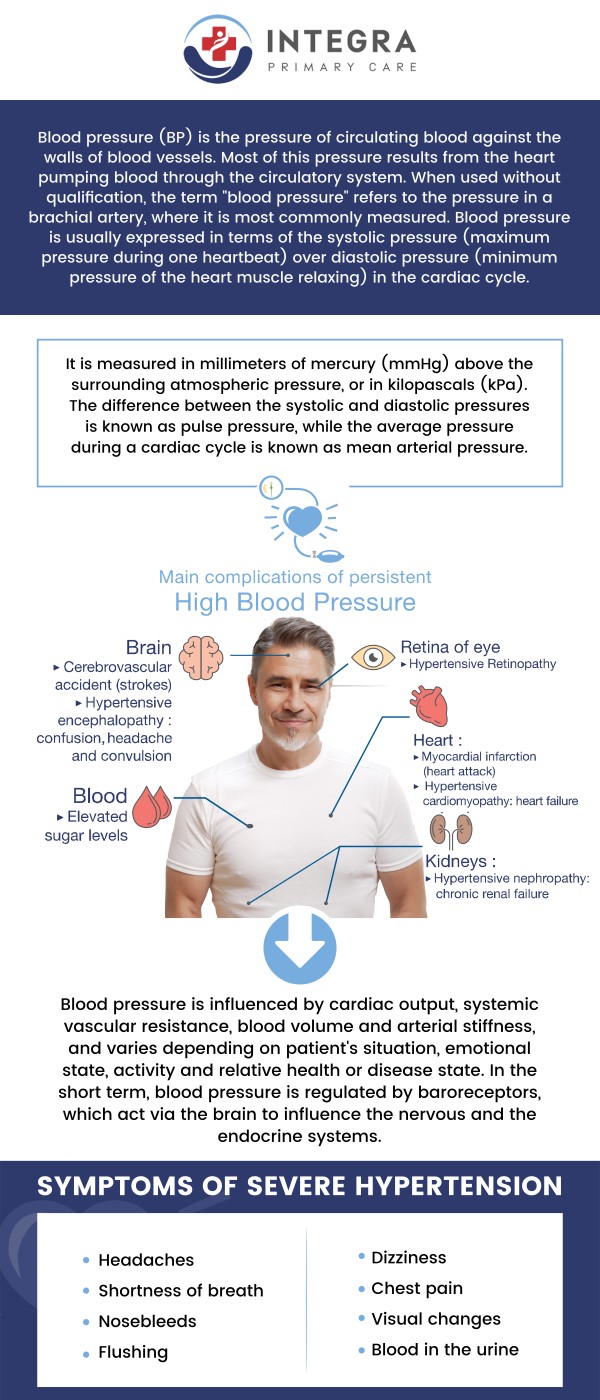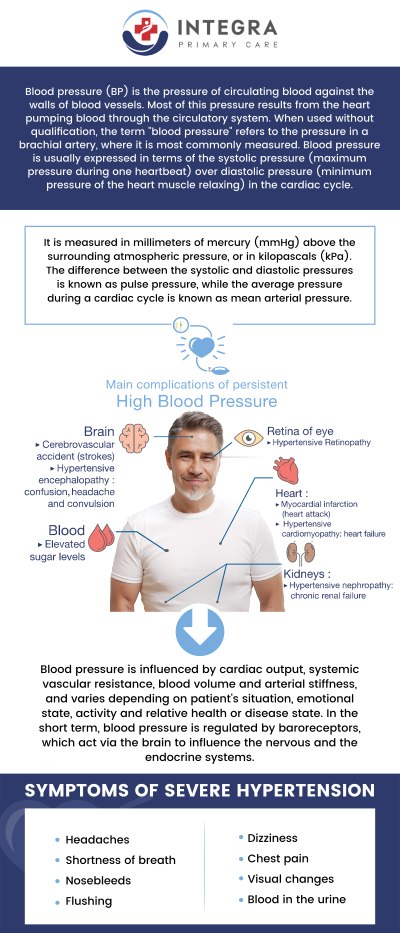High Blood Pressure Treatment Doctor in Canton MA
Finding the right healthcare partner is crucial when managing high blood pressure, a condition often called the “silent killer” because it may not present obvious symptoms. At Integra Primary Care, Bajwa, MD, and his experienced team provide compassionate, personalized care to help you control your hypertension and safeguard your long-term health. We offer a comprehensive approach that includes a customized treatment plan, lifestyle guidance, and ongoing support. For more information, contact us or schedule an appointment online. We are conveniently located at 95 Washington St, Ste 204 B, Canton, MA 02021.


Table of Contents:
What is high blood pressure, and how is it measured?
What are the common symptoms of high blood pressure?
What are the main causes and risk factors of high blood pressure?
How does high blood pressure affect your overall health?
Bajwa, MD’s personalized approach to treating high blood pressure
High blood pressure, or hypertension, is a common condition where the force of blood pushing against your artery walls is consistently too high. Over time, this extra pressure can damage blood vessels and increase the risk of heart disease, stroke, and kidney problems. Most people with high blood pressure do not experience symptoms, which is why regular monitoring is important.
Blood pressure is measured with a sphygmomanometer (blood pressure cuff).
This device records two numbers:
1. Systolic pressure (top number): The pressure in your arteries when your heart beats (normally around 120 mm Hg).
2. Diastolic pressure (bottom number): The pressure when your heart rests between beats (normally around 80 mm Hg).
Readings are written as systolic/diastolic (for example, 120/80 mm Hg).
Measurement steps:
1. Place the cuff around the upper arm and inflate it.
2. As the cuff deflates, the device detects the blood flow and records the pressures.
3. This can be done manually with a stethoscope or with an automated digital monitor.
Blood Pressure Categories for Adults
• Normal: Less than 120/80 mm Hg
• Elevated: 120–129/<80 mm Hg
• High Blood Pressure Stage 1: 130–139/80–89 mm Hg
• High Blood Pressure Stage 2: 140 or higher/90 or higher mm Hg
• Hypertensive Crisis: Over 180/120 mm Hg (emergency care needed)
High Blood Pressure (Hypertension): The “Silent Killer”
High blood pressure, or hypertension, is often called the “silent killer” because it usually has no obvious symptoms. Most people feel normal even when their blood pressure is dangerously high. Meanwhile, the condition can quietly damage your heart, brain, kidneys, and blood vessels over time.
Most Common Symptom: No Symptoms
• Most people with high blood pressure experience no noticeable symptoms.
• You can have high blood pressure for years without knowing it.
• The only reliable way to detect hypertension is by having your blood pressure checked regularly.
When Symptoms Do Occur
Symptoms usually appear only when blood pressure is extremely high or has been uncontrolled for a long time. Possible symptoms may include:
• Severe headaches (especially in the morning or at the back of the head)
• Dizziness or lightheadedness
• Blurred or double vision
• Nosebleeds (rare, except in emergencies)
• Shortness of breath
• Chest pain
• Heart palpitations (pounding in chest, neck, or ears)
• Fatigue or confusion
• Facial flushing
Note: These symptoms are not specific to high blood pressure and are often caused by other conditions. Most people with hypertension have none of these symptoms.
Signs of a Hypertensive Crisis (Medical Emergency)
If your blood pressure reading is 180/120 mmHg or higher and you have any of the following, seek immediate medical attention by calling 911 or your local emergency number:
• Severe chest pain
• Severe headache with confusion or vision changes
• Shortness of breath
• Nausea or vomiting
• Seizures
• Unresponsiveness
• Severe anxiety
High blood pressure, or hypertension, often develops from a combination of genetic, lifestyle, and environmental factors. One of the primary causes is the narrowing or stiffening of blood vessels, which makes it harder for blood to flow, increasing the force needed to push it through. Genetics can play a role, meaning a family history of hypertension raises your risk. Age is another factor, as arteries naturally lose elasticity over time. Lifestyle choices such as a diet high in sodium, being overweight, lack of physical activity, excessive alcohol use, and smoking significantly increase the likelihood of developing high blood pressure. Stress can also temporarily raise blood pressure and contribute to long-term elevation if unmanaged. Certain medical conditions, like diabetes, kidney disease, and sleep apnea, are known risk factors as well. Because high blood pressure often has no symptoms, regular monitoring and adopting healthy habits are crucial to reducing risks and protecting long-term heart health.
How High Blood Pressure (Hypertension) Affects Your Body
High blood pressure (hypertension) means the force of blood against your artery walls is consistently too high. Over time, this “silent killer” can cause serious, sometimes life-threatening damage—often with no symptoms until the harm is already done.
How High Blood Pressure Damages Your Body
1. Heart and Blood Vessels
• Artery Damage & Atherosclerosis: High pressure injures artery walls, making them stiff and prone to plaque buildup. This narrows arteries and restricts blood flow.
• Heart Disease: The heart works harder, causing the muscle to thicken (left ventricular hypertrophy). Over time, this can lead to heart failure.
• Heart Attack: Blocked or narrowed arteries can cut off blood to the heart, causing a heart attack.
• Aneurysm: High pressure can weaken artery walls, causing them to bulge (aneurysm). A ruptured aneurysm can be fatal.
2. Brain
• Stroke: High blood pressure can cause arteries in the brain to burst (hemorrhagic stroke) or become blocked (ischemic stroke).
• Vascular Dementia & Cognitive Decline: Damaged vessels limit blood flow to the brain, raising the risk for memory loss and dementia.
3. Kidneys
• Kidney Damage/Failure: Kidneys filter waste using tiny blood vessels, which are easily damaged by high pressure. This can lead to scarring, kidney failure, and the need for dialysis or transplant.
4. Eyes
• Vision Loss: Fragile blood vessels in your eyes can be damaged, causing retinopathy and vision loss.
– Nerve Damage: Reduced blood flow can harm the optic nerve, leading to further vision problems.
5. Sexual Function
• Men: Damaged blood vessels can cause erectile dysfunction.
• Women: Reduced blood flow may lower libido and cause vaginal dryness or difficulty with arousal.
6. Other Circulatory Problems
• Peripheral Artery Disease (PAD): Narrowed vessels in the legs or arms cause pain, numbness, and even tissue death.
• Aneurysms: Weak spots in arteries can balloon and rupture.
• Metabolic Syndrome: High blood pressure increases risk for insulin resistance, obesity, and type 2 diabetes.
Hypertension silently damages your organs for years before symptoms appear. It greatly increases your risk for heart attack, stroke, kidney failure, vision loss, and more. The good news: it’s preventable and manageable. By understanding the risks and taking action, you can protect your health and enjoy a better quality of life.
At Integra Primary Care, Amer Nazir, MD and Muhammad Ali Haider Bajwa, MD utilize an evidence-based, integrative approach that goes beyond standard medication management. They believe that effective blood pressure control is achieved by understanding the complete picture of a patient’s health. This means working to identify and address the root causes of hypertension, rather than just treating the symptoms.
• The patient-centered treatment journey
• Comprehensive Assessment: Your care begins with a comprehensive assessment that includes a detailed review of your medical history, current lifestyle, and individual risk factors. This allows the doctors to understand the unique factors influencing your blood pressure.
• Targeted Lifestyle Guidance: Nazir, MD and Bajwa, MD provide personalized and achievable recommendations for lifestyle adjustments. This can include targeted dietary advice, like following the DASH or Mediterranean diets, and stress management techniques, such as mindfulness or yoga.
Even if you feel well, regular check-ups are essential. Integra Primary Care is here to help you monitor your blood pressure and develop a proactive plan for your well-being.
For more information, contact us or schedule an appointment online. We are conveniently located at 95 Washington St, Ste 204 B, Canton, MA 02021. We serve patients from Canton MA, Sharon MA, Stoughton MA, Norwood MA, Walpole MA, Randolph MA, Mansfield MA, Dedham MA, and surrounding cities.
Check Out Our 5 Star Reviews


Additional Services You May Need

Additional Services
You May Need
• Annual Physicals
• Wellness Exams
• Medical Weight Loss
• Chronic Disease
• Telehealth
• Sick Visits
• Preventive Care
• Mental Health
• Vaccinations
• Direct Primary Care
• Diabetes
• High Blood Pressure
• Cholesterol
• Asthma
• Minor Injuries
• Men’s Health
• Prostate Screening
• Sexual Health
• Primary Care






